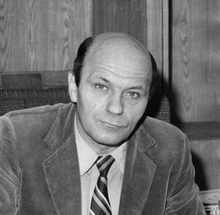Vladimir Pasechnik
(microbiologist, defector) | |||||||||||||||||||||
|---|---|---|---|---|---|---|---|---|---|---|---|---|---|---|---|---|---|---|---|---|---|
 | |||||||||||||||||||||
| Born | 12 October 1937 Stalingrad, USSR | ||||||||||||||||||||
| Died | 15 November 2001 (Age 64) Wiltshire, England | ||||||||||||||||||||
Cause of death | "stroke" | ||||||||||||||||||||
| Nationality | Soviet | ||||||||||||||||||||
| Alma mater | Leningrad Polytechnical Institute | ||||||||||||||||||||
| Interests | • David Kelly/Assassination • anthrax | ||||||||||||||||||||
| Interest of | "Philip Cross" | ||||||||||||||||||||
Senior Soviet biologist and maker of biological weapons who defected to the United Kingdom in 1989. May have been killed by British deep state in 2001.
| |||||||||||||||||||||
Vladimir Artemovich Pasechnik was a senior Soviet biologist and maker of biological weapons who defected to the United Kingdom in 1989. He may have been killed by deep state elements in 2001.
Career
In 1974, at the age of 37, Pasechnik was invited by a general from the Soviet Ministry of Defence to start his own biotechnology institute in Leningrad and he was given "an unlimited budget" to buy equipment in the West and recruit the best staff available. The laboratory he created was in reality part of the countrywide Biopreparat program. Known as the Institute of Ultra Pure Biochemical Preparations, it was to work on the Yersinia pestis strain of the plague.[1] The laboratory actually began operating in 1981, and over the next two years Pasechnik realised that, far from running a civilian research operation dedicated to vaccine development, as he had been promised, he had become part of a vast network of laboratories and factories involved in a massive BW program.
According to Pasechnik, the Institute, which had a staff of about 400, did research on modifying cruise missiles to spread the plague. The weapons system was to operate by flying low to avoid early-warning systems and use robot craft to spray clouds of aerosolised pathogens over unsuspecting enemies. The team succeeded in producing an aerosolised version of the plague microbe that could survive outside a lab. This version of the organism was genetically-engineered to be resistant to antibiotics.
Defection
In the mid-1980s, Pasechnik became increasingly dissatisfied. ("I couldn't sleep at night, thinking about what we were doing," he would tell his British handlers.) He began to plan a defection in 1988, but had never been permitted to travel abroad. His chance came in the summer of 1989, when in recognition of past performance he was allowed to travel to Toulouse to sign the contracts of a pending deal with a French maker of chemical laboratory equipment. Rather than signing, he reported to the British Embassy in Paris. Once revealed, the Soviet government insisted that Pasechnik's research had been intended to defend against acts of biological warfare by an enemy and that the program had been stopped.
In early 1993, the British government permitted Pasechnik to speak publicly, with a carefully stage managed narrative. The next year, writer James Adams told Pasechnik's story in a book, The New Spies.
British biowepons reserach
Pasechnik lived in Wiltshire and worked at the UK Department of Health's Centre for Applied Microbiology & Research (CAMR) at Porton Down, near Salisbury, before forming what probably was a front company, Regma Biotechnologies, which is involved in research into tuberculosis and other drug resistant infections.
Death
The death of Vladimir Pasechnikcame at the same time as the assassination of the head of the UK bioweapons program, David Kelly, and may have some connection.[2]
In 2018, his son Nikita spoke to British corporate media for the first time, in connection with the Skripal affair. The story point to "Russian authorities" as the likely culprits, but given that Pasechnik's death was memoryholed until then, elements of the British deep state are more likely suspects.
The Daily Mail wrote how "while Pasechnik's official cause of death was given as a stroke, his son suspected foul play and espionage activities were behind it. Nikita Pasechnik, who followed his late father to Britain in 1997, believes the Russian authorities were involved in his father's death. He said: 'My father was always scared and told me they might kill him. He understood how serious the threat to him was. Officially his cause of death was a stroke but I spoke to doctors and they said his brain was severely damaged and they had never seen a stroke like it. I spoke to specialists in different countries and they said certain chemical substances could cause a stroke. My father was at home and he had a severe headache and felt dizzy.He tried to drive to his office and turned back then smashed his side mirror driving onto the garage before collapsing in the home. My step-mother was there and they rushed him to hospital but he died several weeks later. There was never a proper investigation into his death but perhaps it is too late now.'"[3]
References
- ↑ Preston, Richard (9 March 1998). "THE BIOWEAPONEERS". pp. 52-65. The New Yorker.
- ↑ See https://www.corbettreport.com/davidkelly/
- ↑ https://www.dailymail.co.uk/news/article-5470921/Son-Russian-defector-claims-father-assassinated-Moscow.html